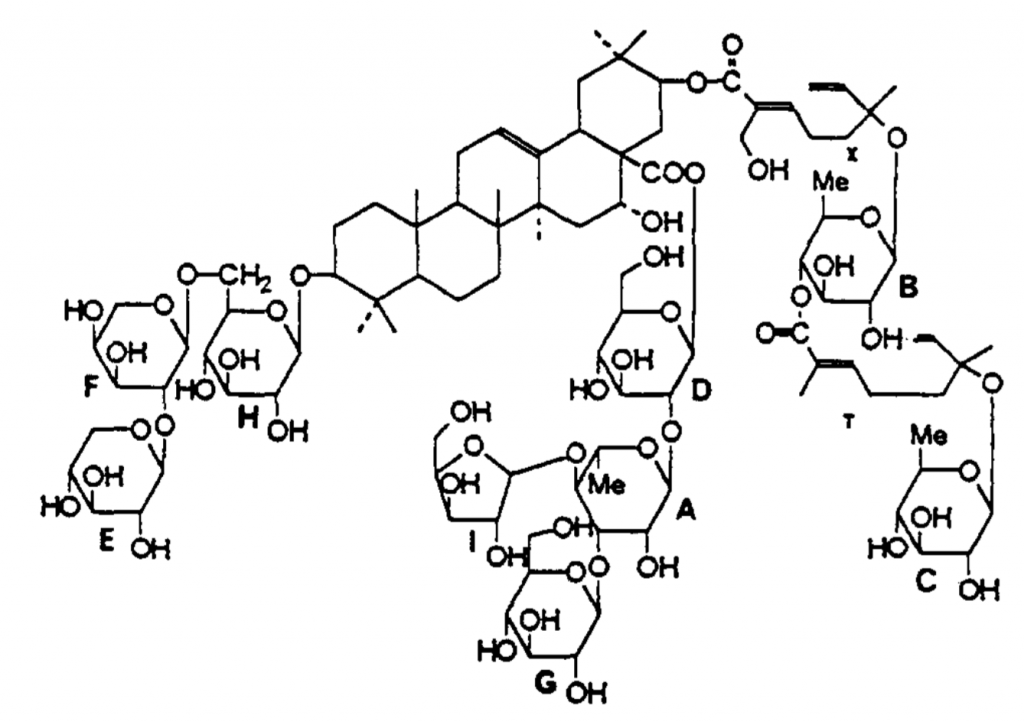 Mimosa (Albizia julibrissin) is an adaptogenic herb belonging to the legume (Leguminosae) family, that has a long use in traditional medicine. In particular, the stem bark of the mimosa tree is used in Traditional Chinese Medicine as a sedative and anti-inflammatory. The medicinal effects of mimosa are thought to derive at least partly from a group of phytochemicals called julibrosides. Studies have isolated individual julibrosides and demonstrated they have physiological effects in animals and humans. However, in addition to the julibrosides, there may be other chemicals that can explain some of the health effects of mimosa. For example, flavonoids are present in the foliage of mimosa. Flavonoids have particular antioxidant effects and their presence may explain the anti-inflammatory effects of mimosa. In particular, the flavonoid quercetin is present in amounts of up to 2 % of total foliage. The quercetin glycosides, hyperoside (quercetin-3-O-galactoside) and quercitrin (quercetin-3-O-rhamnoside) are present.
Mimosa (Albizia julibrissin) is an adaptogenic herb belonging to the legume (Leguminosae) family, that has a long use in traditional medicine. In particular, the stem bark of the mimosa tree is used in Traditional Chinese Medicine as a sedative and anti-inflammatory. The medicinal effects of mimosa are thought to derive at least partly from a group of phytochemicals called julibrosides. Studies have isolated individual julibrosides and demonstrated they have physiological effects in animals and humans. However, in addition to the julibrosides, there may be other chemicals that can explain some of the health effects of mimosa. For example, flavonoids are present in the foliage of mimosa. Flavonoids have particular antioxidant effects and their presence may explain the anti-inflammatory effects of mimosa. In particular, the flavonoid quercetin is present in amounts of up to 2 % of total foliage. The quercetin glycosides, hyperoside (quercetin-3-O-galactoside) and quercitrin (quercetin-3-O-rhamnoside) are present.

Mimosa (Albizia julibrissin) is an adaptogenic herb. In this regard its activity is similar to that of Panax ginseng. Adaptogenic herbs balance physiological disruption and therefore have general anti-stress effects. Mimosa extracts contain a number of phytochemicals including a group of chemicals called the julibrosides. Other phytochemicals present include various flavonoids. One flavonoid, hyperoside, is also present in St John’s wort. It has been suggested that hyperoside, and possibly other quercetin glycosides, may be responsible for the mood elevating effects of the mimosa. Image is Julibroside J1, image from Ma et al. (2006).
Julibrosides are triterpenoid saponins, and in this regard are complex ring structures with additional sugar molecules bonded in various configurations. The bonded sugars are numerous and can in some cases julibrosides can have nine sugar residues attached. There are a large number of similarly structured julibrosides in mimosa stem bark extracts and these are designated julibroside J1, julibroside J2 etc. Triterpenoids contain 3 terpene molecule bonded together. In Julibroside J1 for example, the triterpenoid molecule is composed of a terpene molecule, two monoterpenes and nine sugar residues. Studies investigating individual julibrosides have shown they possess anti-anxiety effects in animal models. For example, julibroside C1 has been isolated and found to possess anxiolytic effects likely due to activation of the benzodiazepine receptor system in combination with modulation of serotonin levels. This supports the traditional use of mimosa as a mood elevating herb.
Eat Well, Stay Healthy, Protect Yourself
RdB
